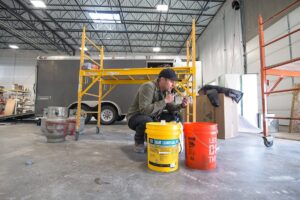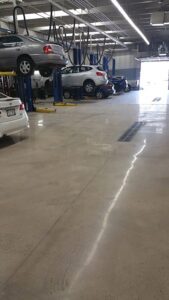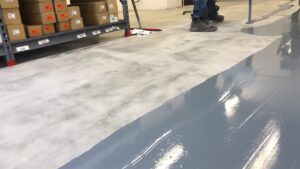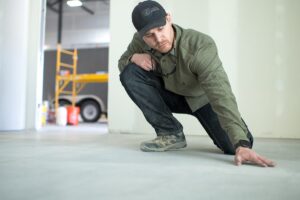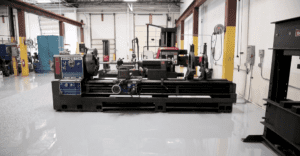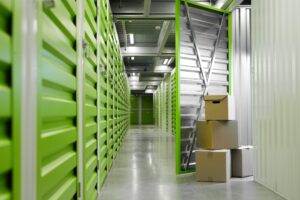BLOG
The flooring of your commercial property is one of the most important parts of your facility. Keeping it clean and in good condition is not just a matter of aesthetics, but also one of efficiency and safety. When you make sure that your floor is professionally cleaned, you can often remove buildup and ensure that your place of business will continue to look its best. But no matter how well you maintain your flooring, not even consistent upkeep will protect your flooring forever. Foot traffic, corrosive chemicals, vehicles, heavy machinery, and moisture buildup are common issues that commercial floor coating faces. These sorts of wear and tear can quickly scratch or dull your floor’s topcoat, or even strip away layers of your flooring when they are cleaned improperly. Natural weathering, accidents, and damage can still occur over time, and eventually your floor will need to be replaced. Signs Your Commercial Floor Coating Needs A Replacement Your floor may not tell you when it is time to replace commercial floor coating and give up on continuing repairs. You will have to […]
...READ MOREEpoxy coated floors or commercial concrete floors are ideal in commercial facilities where moisture is a concern. They both stand up well to liquid elements, remain relatively slip resistant even when wet, and are easy to clean after any liquids or other substances have gotten onto them. But there are certain commercial settings where you may regularly have several inches of water from operations or cleaning that you need to drain away. Taking into account drainage needs when planning your commercial flooring installation makes it easy to optimize drainage to make sure that your floors are protected. Considerations When Planning for Concrete Floor Drainage In commercial facilities, epoxy and concrete are resilient substances. But when water or other liquids sit on them for a long period of time, they can start to wear away the flooring. This is why it is recommended that you wipe up any spills as soon as possible on epoxy and promote good drying conditions and speed evaporation in properties with concrete floors. But if you will frequently have larger amounts of water or spillage, floor […]
...READ MOREBusiness does not stop in the winter, so even as temperatures hit freezing in Denver and elsewhere in Colorado, flooring construction, replacement, and repair will continue. When it comes to concrete flooring, this can require a few special steps. Concrete does best when temperatures during installation and curing are above 50 degrees. But with winters in Colorado, that is not always a possibility. Even indoors, facilities can often be too cold for a standard concrete installation. Having a commercial flooring contractor who knows what steps to take in order to give you a high quality floor, regardless of weather conditions, is essential for concrete flooring solutions in Colorado. Strategies for Pouring Concrete in Cold Weather Installing commercial flooring in the winter requires achieving similar conditions for both the base and the environment that you would find on warmer days. But these adjustments must be made without introducing any elements into the environment that could contaminate the concrete. Another important step is to adapt the concrete itself to enable a faster, but still strong, cure. These objectives can be met with a combination […]
...READ MOREAt a busy commercial property, you might have hundreds or even thousands of feet walking across an area on any given day. Naturally, this puts a lot of stress on your floor and will start to cause both visible and physical wear over time. Certain flooring materials are better at withstanding the heavy wear and tear, degrading more slowly. These durable flooring options are some of the best to consider for a high traffic floor finish or even your entire property as they offer attractive and cost effective solutions as well. High Traffic Floor Finish for Properties in Denver Foot traffic and vehicle traffic can cause wear to your floors in a number of different ways. The weight is somewhat of a stressor, as are scratches and scuffs. Shoes can also track in dirt and grind it into a floor’s surface, which will eventually corrode it. While it is impossible to avoid these effects with any floor, there are a variety high traffic floor finishes that are more resilient to heavy foot traffic: Sealed Concrete – Concrete is already an […]
...READ MOREConcrete flooring is a good choice for commercial and industrial properties because of its durability and resilience. With natural strength, even a standard concrete with minimal thickness has impressive load bearing capabilities. 3000 psi is the standard of compressive strength on a concrete slab. But this is only a base capability of concrete. With adjustments to the initial concrete mixture and the installation process, and by utilizing an experienced commercial flooring contractor, it is possible to increase the concrete weight limit significantly so that it can stand up to more demanding commercial applications, such as the weight of heavy machinery or industrial equipment. At Colorado Concrete Repair, determining the concrete weight limit and how to achieve them with a concrete installation is part of our reverse engineering process. There are many customization options available with concrete and other commercial flooring. By first determining the specifications that your floor needs to meet for both your industry and the way you regularly use it, our team can use our knowledge of concrete flooring installation to plan and install a floor that will […]
...READ MOREAppearance and functionality are important when choosing the features for your commercial facility. But cost is almost always the deciding factor when choosing flooring. This includes more than just the cost of the initial installation and materials. A commercial floor will ideally last for years and you want to be aware of how much money you might need to spend on repairs and maintenance to keep your floor looking good and performing well during this time. By taking these factors into account, you can make sure you are getting a floor that is not only the right commercial floor cost up front, but continues to meet your requirements while staying within your budget throughout its lifetime. Ongoing Commercial Floor Cost The cost you will pay to maintain flooring in the years after installation will depend largely on the type of floor and your environment. Understanding all the different environmental factors makes it possible to choose flooring that will work in your specific environment with as few repairs as necessary: Dirt – Almost every surface will collect some dust from time […]
...READ MORE
